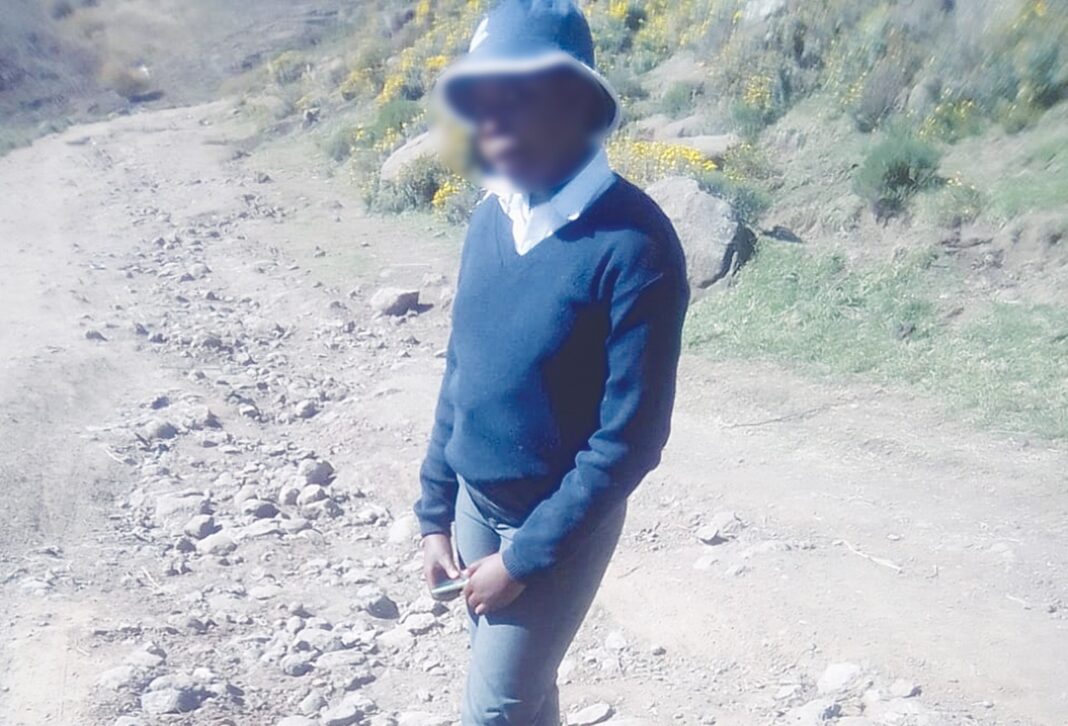By Neo Kolane
Students of the remote village of Ha Peete in the Quthing district are forced to trek up to eight hours a day to school at Mphaki and back due to lack of public transport after the current heavy rains destroyed the gravel road between the two villages.
This was revealed by the councillor of Ha Peete, Karabo Lesala, who estimated that the village is over 20 kilometers from Mphaki where the nearest high schools are located.
Lesala told theReporter that this is one of the many causes of dropouts witnessed in the Quthing district.
He said that the road between Ha Peete and Mphaki has been damaged by the recent heavy rains, adding that public transport between the villages is no longer available because of the untenable condition of the road.
“The vehicles that are seen here are mostly private cars. Most of them are bakkies that sometimes help villagers who have to pay exorbitant fares because the road is badly damaged and there doesn’t seem to be any plans to repair it,” he said.
“The fares range between M45 to M50. When there are heavy rainfalls, the owners of the cars park them and not drive around because of the poor condition of the road which could put the lives of drivers in danger,” he observed.
He narrated that during the Easter holidays, there was heavy rainfall and no vehicle was seen on the road; this made it hard for students to go back to school “because they had to walk while carrying luggages.”
Many of the students who are forced to endure this hardship are girls who are uncomfortable bumping into strangers on their way between home and school.
The are two villages between Ha Peete and Mphaki.
“We have raised the issue of the condition of the road with the local authorities in Mphaki and Telle. We were told that it is the responsibility of the ministry of public works to fix the road. That was in 2017, but nothing has happened ever since,” Lesala said.
He said at one point, one businessman told the villagers to contribute M20 so that he could fix the road but that turned out to be a short-lived remedy as the rains battered the area.
“Parents whose children attend boarding schools always try to supply the children with provisions, but they do not do this consistently because of the long distances they have to travel.
“The parents have made an impassioned plea to government to build a high school in the close proximity of their villages. The three nearest high schools are Mopeli, Mphaki and ‘Maseribane.”
One of the students, Refuoe Chake, who lives at Ha Peete and schools at Mphaki High School, confirmed the ordeal of the learners. She said they are driven by a desire to learn, forced to walk the long distances to get to school.
The 19-year old learners told this publication that they have to brave the bad road in the morning and after school.
She went on to say there are no villages nearby. She added that sometimes they get home very late from school.
Refuoe lamented that they have to contend with being accosted by herd boys and other shady characters, who harass and threaten them with violence.
She expressed her wish for a school to be built within safe walking distance. She added female learners have to walk in groups in order to feel safe.
She has been walking the long distance since she started schooling. “As a result of inevitable fatigue, we do not do our school home work as best as we would like as we have other household chores to perform upon arrival at home. We leave for school at 3:00am and get there at 8:00. We then leave school after 4:00pm and get home after 9:00pm.”
She is now in Grade 10.
One of the parents, ‘Marethabile Chake said walking long distances in hostile conditions is a price that their children have to pay in order to get education.
“It is a gut-wrenching experience for our children. When they get home they are so exhausted that they cannot do any household chores at all. There is one learner in our village who cannot walk this long distance as she is sick,” she noted.
Commenting on the implications of the learners’ ordeal on their capacity to learn, the president of the Lesotho Schools’ Principals Association (LESPA) ‘Mathafeng Moteuli conceded that walking such long distances to school has a negative impact on the students.
“Many of us walked long distances to and from school but we still performed very well,” she remarked.
However, she admitted that reading and studying at home becomes difficult for the students.
“That school is just too far. When they get home in the evening, they do not have time to read or study anything because they are usually tired. It impairs they concentration and performance,” she contested.
She added that students in the district usually drop out just after completing Grade 8. They then migrate to the neighbouring South Africa to seek jobs in farms.









